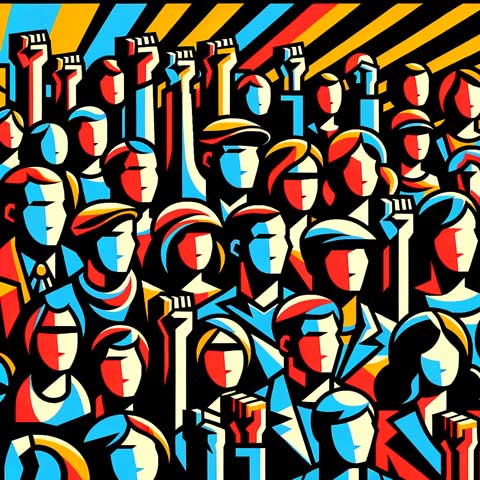Welcome to the first part of our three-part series on populism, inspired by Jan-Werner Müller’s book “What Is Populism?“. In an era where fake news and the rise of populist parties and politicians in the US, the EU, and beyond are becoming increasingly prominent, it’s crucial to gain a deeper understanding of this phenomenon. This series is designed to guide you, regardless of prior knowledge, through the complex world of populism.
An Introduction to the Series
In this inaugural article, we delve into the essence of populism as seen by Müller. Jan-Werner Müller, a respected political scientist, offers a profound analysis of populism in his book, a political approach gaining significant traction worldwide. His insights are key to comprehending the contemporary political dynamics.
What is Populism?
Jan-Werner Müller describes populism as a political approach deeply entrenched in identity politics. This approach divides society into two clearly demarcated groups: on one side, a ‘people’ portrayed as morally pure and homogeneous, and on the other, an elite depicted as corrupt and morally inferior. This simplistic and polarizing worldview creates a stark divide between ‘us,’ the common people, and ‘them,’ the elite.
Take, for instance, the political campaigns of figures like Donald Trump in the United States or Geert Wilders in the Netherlands. Their rhetoric often emphasises a strong distinction between the ‘ordinary people’ and the ‘corrupt elite,’ positioning themselves as the voice of the former.
The Populist Claim
Populists often claim to be the sole true representatives of ‘the people.’ This leads to a politics of exclusion, where anyone who doesn’t fit their version of ‘the people’ is marginalized.
In the context of immigration, for example, we see how some European populist parties, like France’s Rassemblement National (formerly Front National), reject immigration and multiculturalism as not being ‘truly French.’ This creates an image of a homogeneous national identity threatened by external influences.
This exclusionary stance often extends beyond just immigration policy. It touches the core of how populists view society and its citizens. By adhering to a strict definition of ‘the people,’ anyone who doesn’t meet these criteria, such as certain ethnic groups, religious communities, or political opponents, is effectively excluded from participating in the national discourse. This can lead to polarization in society, pitting groups against each other and undermining the sense of national unity and solidarity.
This ‘us versus them’ tactic is a potent tool for populists. It allows them to reduce complex social issues to simple, emotionally charged themes. This can result in strengthening their political base, but it also carries risks, such as weakening social cohesion and undermining the principles of pluralism and democratic inclusion.
The Dichotomy of Pure People versus Corrupt Elite
This dichotomy is a core aspect of populism. Populists portray themselves as the voice of the ‘pure people,’ while depicting the elite as corrupt and disconnected from the reality of the ordinary citizen.
Consider the Brexit campaign in the United Kingdom, where leaders like Boris Johnson painted the EU elite as detached from British citizens, presenting Brexit as a way to return control to the ‘real’ people.
This strategy of creating an enemy image is a commonly used tactic in populist discourse. By consistently portraying the elite as corrupt and untrustworthy, populists reinforce the notion that they are the only reliable representatives of the people. This black-and-white thinking simplifies complex political and economic issues into a battle between good and evil, with populist leaders positioning themselves as the saviors of the people. This rhetoric often resonates strongly with citizens who feel forgotten or ignored by traditional politics.
However, this simplification of political reality can lead to a disturbing decline in trust in existing institutions and processes. It can also pave the way for authoritarian tendencies, where populist leaders amass more power under the guise of ‘protecting’ the people from the corrupt elite. This undermines the checks and balances essential for a healthy democracy and can lead to an erosion of civil liberties and rights.
Setting the Stage for Further Discussion
In our next article, we will delve deeper into the impact of populism on democracy. How does this political movement influence the foundations of democratic societies?
Unraveling Populism: A Path to Deeper Understanding
In this first article of our series, we have explored the foundations of populism, as laid out by Jan-Werner Müller. We have seen how populism manifests as a political approach that creates a sharp division between an alleged ‘pure people’ and a ‘corrupt elite.’ This simplistic yet powerful portrayal has profound implications for our society and democracy.
The upcoming articles in this series will further explore these themes. We will examine how populism influences and challenges the foundations of our democratic societies and how we, as a society, can respond to the rise and appeal of populist movements. It is crucial that we engage in this discussion, not only to better understand the current political landscapes but also to protect and promote the values of pluralism and democracy.







